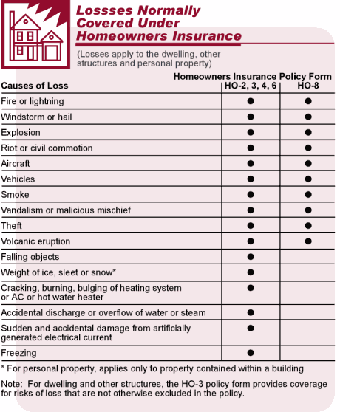
The price you pay for your homeowners insurance can vary by hundreds of dollars, depending on the insurance company you buy your policy from. Here are some things to consider when buying homeowners insurance.
1. Shop Around
It'll take some time, but could save you a good sum of money. Ask your friends, check the Yellow Pages or contact your state insurance department. (Phone numbers and Web sites are listed here.) National Association of Insurance Commissioners (http://www.naic.org/) has information to help you choose an insurer in your state, including complaints. States often make information available on typical rates charged by major insurers and many states provide the frequency of consumer complaints by company.
Also check consumer guides, insurance agents, companies and online insurance quote services. This will give you an idea of price ranges and tell you which companies have the lowest prices. But don't consider price alone. The insurer you select should offer a fair price and deliver the quality service you would expect if you needed assistance in filing a claim. So in assessing service quality, use the complaint information cited above and talk to a number of insurers to get a feeling for the type of service they give. Ask them what they would do to lower your costs.
Check the financial stability of the companies you are considering with rating companies such as A.M. Best (http://www.ambest.com/) and Standard & Poors (http://www2.standardandpoors.com/NASApp/cs/ContentServer?pagename=sp/Page/HomePg) and consult consumer magazines. When you've narrowed the field to three insurers, get price quotes.
2. Raise Your Deductible
Deductibles are the amount of money you have to pay toward a loss before your insurance company starts to pay a claim, according to the terms of your policy. The higher your deductible, the more money you can save on your premiums. Nowadays, most insurance companies recommend a deductible of at least $500. If you can afford to raise your deductible to $1,000, you may save as much as 25 percent. Remember, if you live in a disaster-prone area, your insurance policy may have a separate deductible for certain kinds of damage. If you live near the coast in the East, you may have a separate windstorm deductible; if you live in a state vulnerable to hail storms, you may have a separate deductible for hail; and if you live in an earthquake-prone area, your earthquake policy has a deductible.
3. Don't confuse what you paid for your house with rebuilding costs
The land under your house isn't at risk from theft, windstorm, fire and the other perils covered in your homeowners policy. So don't include its value in deciding how much homeowners insurance to buy. If you do, you will pay a higher premium than you should.
4. Buy your home and auto policies from the same insurer
Some companies that sell homeowners, auto and liability coverage will take 5 to 15 percent off your premium if you buy two or more policies from them. But make certain this combined price is lower than buying the different coverages from different companies.
5. Make your home more disaster resistant
Find out from your insurance agent or company representative what steps you can take to make your home more resistant to windstorms and other natural disasters. You may be able to save on your premiums by adding storm shutters, reinforcing your roof or buying stronger roofing materials. Older homes can be retrofitted to make them better able to withstand earthquakes. In addition, consider modernizing your heating, plumbing and electrical systems to reduce the risk of fire and water damage.
6. Improve your home security
You can usually get discounts of at least 5 percent for a smoke detector, burglar alarm or dead-bolt locks. Some companies offer to cut your premium by as much as 15 or 20 percent if you install a sophisticated sprinkler system and a fire and burglar alarm that rings at the police, fire or other monitoring stations. These systems aren't cheap and not every system qualifies for a discount. Before you buy such a system, find out what kind your insurer recommends, how much the device would cost and how much you'd save on premiums.
7. Seek out other discounts
Companies offer several types of discounts, but they don't all offer the same discount or the same amount of discount in all states. For example, since retired people stay at home more than working people they are less likely to be burglarized and may spot fires sooner, too. Retired people also have more time for maintaining their homes. If you're at least 55 years old and retired, you may qualify for a discount of up to 10 percent at some companies. Some employers and professional associations administer group insurance programs that may offer a better deal than you can get elsewhere.
8. Maintain a good credit record
Establishing a solid credit history can cut your insurance costs. Insurers are increasingly using credit information to price homeowners insurance policies. In most states, your insurer must advise you of any adverse action, such as a higher rate, at which time you should verify the accuracy of the information on which the insurer relied. To protect your credit standing, pay your bills on time, don't obtain more credit than you need and keep your credit balances as low as possible. Check your credit record on a regular basis and have any errors corrected promptly so that your record remains accurate.
9. Stay with the same insurer
If you've kept your coverage with a company for several years, you may receive a special discount for being a long-term policyholder. Some insurers will reduce their premiums by 5 percent if you stay with them for three to five years and by 10 percent if you remain a policyholder for six years or more. But make certain to periodically compare this price with that of other policies.
10. Review the limits in your policy and the value of your possessions at least once a year
You want your policy to cover any major purchases or additions to your home. But you don't want to spend money for coverage you don't need. If your five-year-old fur coat is no longer worth the $5,000 you paid for it, you'll want to reduce or cancel your floater (extra insurance for items whose full value is not covered by standard homeowners policies such as expensive jewelry, high-end computers and valuable art work) and pocket the difference.
11. Look for private insurance if you are in a government plan
If you live in a high-risk area -- say, one that is especially vulnerable to coastal storms, fires, or crime -- and have been buying your homeowners insurance through a government plan, you should check with an insurance agent or company representative or contact your state department of insurance for the names of companies that might be interested in your business. You may find that there are steps you can take that would allow you to buy insurance at a lower price in the private market.
12. When your buying a home, consider the cost of homeowners insurance
You may pay less for insurance if you buy a house close to a fire hydrant or in a community that has a professional rather than a volunteer fire department. It may also be cheaper if your homes electrical, heating and plumbing systems are less than 10 years old. If you live in the East, consider a brick home because it's more wind resistant. If you live in an earthquake-prone area, look for a wooden frame house because it is more likely to withstand this type of disaster. Choosing wisely could cut your premiums by 5 to 15 percent.
Check the CLUE (Comprehensive Loss Underwriting Exchange) report of the home you are thinking of buying. These reports contain the insurance claim history of the property and can help you judge some of the problems the house may have.

Remember that flood insurance and earthquake damage are not covered by a standard homeowners policy. If you buy a house in a flood-prone area, you'll have to pay for a flood insurance policy that costs an average of $400 a year. The Federal Emergency Management Agency provides useful information on flood insurance on its Web site at FloodSmart.gov. A separate earthquake policy is available from most insurance companies. The cost of the coverage will depend on the likelihood of earthquakes in your area. In California the California Earthquake Authority (http://www.earthquakeauthority.com/) provides this coverage.
If you have questions about insurance for any of your possessions, be sure to ask your agent or company representative when you're shopping around for a policy. For example, if you run a business out of your home, be sure to discuss coverage for that business. Most homeowners policies cover business equipment in the home, but only up to $2,500 and they offer no business liability insurance. Although you want to lower your homeowners insurance cost, you also want to make certain you have all the coverage you need.
Related Articles
- How To Save On Homeowners Insurance
- Homeowners insurance: What you need to know
- The value of home maintenance
- Home Maintenance Checklist
- Homeowners Insurance Guide
- How to Buy a HUD Home
- How to Sell Your Home In a Down Market
- Do You Qualify for an FHA Loan?
 Print
Print Email
Email







